Soul of a Gunslinger Read online
Page 2
“Sit back down and mind your elders,” the talker said with a crazy, sideways grin. “This ain’t none of your affairs, and besides, you ain’t old enough to be telling growed-up men what to do.”
“I’ll soon be eighteen which is growed-up in this part of the country, and with this gun hanging at my side, I’m just as old as you, maybe older.”
The belligerent man pushed back his chair and stood. “Better watch out young man, or you’re liable to get yourself killed. Why don’t you go on about your business and leave us alone, so we can get back to our card playing?”
“Can’t,” Lefty said, acting like a full-grown man with his tied down gun hanging on his left side with the hammer’s rawhide hanging loose. “Not ‘til you say you’re sorry for talking about Mr. Houston that way.” The other men at the table eased back several feet against the wall. They knew words had most likely gone too far without a shooting.
“That ain’t gonna happen,” the belligerent card player said. “I ain’t saying I’m sorry no matter what… even if I have to kill ‘ya.”
“If you ain’t saying it, you’d best be drawing,” Lefty blurted out with his legs spread slightly, “cause you ain’t leaving this here saloon alive, less I hear you say you’re sorry.”
The loud talker took-on a sideways smile and then pretended to be waving the whole matter off by swinging his arms, but in reality, he was only trying to distract Lefty while reaching for his gun. It didn’t work. He was dead before hitting the dirt floor with a bullet hole in the middle of his forehead. As Lefty stood over the dead man with his smoking gun hanging at his side, he felt a deep burning in his right thigh. Looking down, he saw that his pant leg was covered in blood around a dark hole where he’d been shot. In spite of the hole in his leg and it starting to hurt something fierce, he was able to limp over to a chair and sit down. After his stomach settled-down from killing a man, he removed his bandanna from his neck and tied it tightly around his leg to stop the bleeding.
It wasn’t long until the batwings swung open, and a man with a sheriff’s badge pinned to his vest came hurrying in. Seeing the dead man lying on the floor, he called out, “What’s going on here? This is the fourth killing this month and the month ain’t half over yet! Who got killed and who did the shooting?” the sheriff asked with a scrolled face as he went to the body lying on the floor. He turned it over and then looked up facing the card players. “I ain’t ever seen this man before.”
“He called himself, Albert,” one of the card players said, “He was a newcomer to town. None of us has laid eyes on him before.” The poker players testified the dead man had drawn first, but the young man was faster. “Yaw,” said one of the card players, “He was faster than greased lightning.”
The sheriff turned to Lefty, “I’ve seen you around town before, young man. Who are you?”
Remembering the sheriff’s question brought Lefty’s mind back to his mountaintop. Who am I? I didn’t have a rightful reason for killing that man. He didn’t do nothing to me. What’s becoming of me? Lefty reached for the coffee pot, but the pain caused him to sit back. It’s time to go home and fess-up to Ma how I got this bullet hole in my leg. Lefty rose in jabs of pain, fetched two pots of water from the stream to douse out the fire, and then whistled for Star. The western sky was fading as they descended the mountain.
Chapter Two
It was unusually hot at the Newman Ranch for the month of March in 1849. The bright sun wouldn’t let up, and a cloud hadn’t been seen for weeks. This time of the year was considered the rainy season, but this year was different, rain was only a memory.
Lefty’s leg hadn’t totally healed, and his limp was still visible, but it was roundup time and time to hit the saddle. He and Bub started crawling out of bed early to do chores before heading out to the cows. Because of the ranch’s isolation, branding wasn’t necessary like most spreads in southwest Texas, but the stragglers needed to be driven closer to home, and the spring born male calves needed to be castrated before they got big and hard to handle.
Bub and Lefty headed out with a horse tethered behind each of them to a different location where they’d found cows in the past. It was a stressful job for the horses, chasing cows over the hilly terrain, especially in the hundred-degree weather, so the men switched to the tethered horses at high noon. Like most years, the old mosey-horned cows were hard to get out of the thickets and ravines, and even then, they were headstrong for the first couple hours and tried to go their own way, but the horses were trained to corral them back into the group. It was risky riding among the cows. An old mosey-horn with horns six-foot wide from tip-to-tip and the ends as sharp as needles could swing their head and penetrate whatever they hit several inches, even a man or horse, causing serious injuries. Deaths had been known to occur, so both horse and man at the Newman Ranch had learned to stay back several yards.
After the herd had been brought closer in, days were spent riding through the cows picking out the spring-born males calves. When one was found, Bub would lasso its hind legs, and Lefty would tie all four legs together and then cut out its testicles. Afterward, Bub would drag the castrated calf to a pinned-off area before going after another.
Both men felt good over what they’d seen in the roundup. There were more calves than most years, and the calves seemed to be in good shape in spite of the sparse grass and the dried-up streams and water holes. Words weren’t spoken, but each man knew the extra calve crop would bring in more money than usual next year, helping their struggling ranch to get on its feet a mite better. That is, if the cows could be kept free of Hoof and Mouth Disease and other losses and if a buyer could be found.
The roundup days were long and tiring. Lefty and Bub rode home in the dark on worn-out horses, and by the time they’d fed and watered and tended them, it was time for the men to wash up and eat. Their ma always had a meal that stuck to their ribs and a pot of strong, steaming coffee waiting on them. Their tired bodies weren’t in the mood to do much of anything, so after eating and drinking a couple of cups of coffee, the men climbed the ladder to their loft.
By the last of April, the herd had been serviced with a few head set-aside to be sold to replenish their money jar. Cow prices and buyers had been hard to come by for the last few years and the present year was no exception. It took Bub several days to talk a buyer into buying their set-a-side cows and three dollars a head was all the man offered.
The days following the roundup were kind of ho-hum, allowing them to catch up on odd jobs they’d set aside. Shoeing their five horses was one of those catch-up jobs that took place every year, and on a hot morning in May, Lefty was busy in the barn with Star’s hoof raised, putting on a new shoe. His ma and brother were busy feeding the orphaned calves he and Bub had come across during the roundup. They brought in fourteen and expected most of them to die, but eleven were still alive and doing fine on Blue and Brown’s milk.
By noon, they’d finished their barn work and were heading to the house to eat when they saw a plume of dust in the distance. Lefty cupped his hands around his eyes for a better look. It was a rider on a roan horse with a black pack-horse tethered behind coming at a slow pace. Several minutes later, the rider stopped a good distance from the house and did what most decent men do, “Hello the house,” he called out. Bub waved him in. Minutes later he rode up to the hitching rail beside the porch. “Howdy,” he said in a deep southern drawl with a contagious smile, “my name is James Hideman, but folks call me Hide.”
Hide was a pleasant-looking man of average size, not skinny but not fat. He looked to be in his late twenties. His brown, flat-crowned hat was sweat-stained and out of shape. It had a rawhide band circling the crown that could be used as a chin strap. His face was a golden brown, his large eyes were blue, and his hair, mustache, and short-trimmed beard were dark brown. From the look of his clothes, he was a range man. He wore a blue shirt, partially covered with a black leather vest. The wide leather belt, clad with a big silver buckle, circled his
black wool pants, and the pointed-toe boots he wore were a bit worn down in the heels, but they weren’t bad. Lefty smiled when he saw Hide’s gun. He could tell right off that Hide wasn’t much of a gunman because his gun rested too high up on his right side for an easy draw.
Mrs. Newman looked him over good and sized him up to be a good sort of a man who could be trusted, so she said, “We’re fixing to have a bite to eat, and you’re welcome to join us if you want. Climb down and get washed-up. There’s a bucket of water and a wash pan on the yon side of the porch.” Hide grinned as he stepped down and tied both of his horses to the hitching rail.
“I didn’t mean to butt-in and disturb your meal, ma’am, but I welcome your invite if it ain’t too much trouble. It’s been a spell since I ate breakfast.”
She nodded with piercing eyes, “A traveler ain’t ever turned away from coffee and food at my house, so light-a-shuck and join us.”
After coffee had been poured and everyone had taken a chair at the table, Mrs. Newman said a blessing and then nodded for the platters of food to be passed. Fried potatoes, fried okra, sliced tomatoes, and thick sliced bacon circled the table. In the middle of the table were warmed-over morning biscuits, butter, and apple jelly. Like most ranch meals, the food was eaten without lingering and without many words.
Mrs. Newman had removed the dirty dishes and was bring the coffee pot to the table when she said, “It looks to me you’re planning to travel a considerable distance from the load on your pack-horse, I know it ain’t none of our business, Hide, but do you mind telling us where you’re headed?”
Hide took-on a puzzled look. “I figured you had already guessed that, ma’am, with all of the news and commotion that’s been taking place lately.”
Lefty stiffened with a wrinkled forehead. “We ain’t got a notion what you’re talking about. What do you mean, the news and commotion that’s been taking place?”
“Ain’t you heard?” Hide asked enthusiastically. “A fellow by the name of James Marshall struck gold in the mountains in up-state California come January a year ago. The word has it, the mountain streams in that part of the country are chock full of big gold nuggets just waiting to be panned. A man can become a millionaire in just a few days. I was told the country is filling up like wildfire with prospectors from all around the country. There are even ships coming into the San Francisco harbor from foreign countries loaded with men on the hunt. At least that’s what I’ve been told.”
Lefty was all excited and ready to say something when Bub broke in, “I ain’t calling you a liar, Hide, but it sounds to me like all of that gold talk ain’t nothing but a big tale some drunk has made up. How’d you come up with this yarn in the first place?”
“A man in Pecos passed around a San Francisco newspaper he’d received from a friend telling about the gold strike. That was a few days back and the town ain’t been the same since the word got out. Everyone’s talking about it in Pecos and men are leaving in droves for northern California. A few entire families have left.” Hide reached into his vest pocket and pulled out a sheet of paper. “This here paper has the information of the newspaper written on it; you can read it for yourself.” Hide stretched the paper at arms-length toward Bub, but he didn’t take it.
“I ain’t able to read and neither can my ma or brother. You can read what it says to us.”
Hide looked rather sheepish and said with downcast eyes, “I ain’t able to read neither. I just carry the paper around to impress folks who can read, but there ain’t many who can.”
Lefty stayed wide-eyed sitting at the table drinking coffee while Hide kept talking about the gold fields and all of the money a person could make. He seemed to have swallowed Hide’s entire yarn and was becoming increasingly amazed at it by the minute. Mrs. Newman’s eyes were glaring, and her lips were puckered as she watched her son get all lathered-up and gobble the story about the gold find and how easy it was to become a millionaire. But she kept her thoughts to herself and didn’t offer her opinion about the whole thing being a pack of lies.
It was time to get back to work; they’d been in the house long enough listening to Hide. To help offset the meal he’d eaten, Hide volunteered to help Bub and Lefty cut logs and chop firewood which lasted most of the afternoon. By the time the cutting was over, it was time to do barn chores, so Hide pitched in and helped. His job was to throw ears of corn to the hogs and fill their watering troughs from the stream. While Hide tended to the hogs, Bub and Lefty milked Blue and Brown.
Walking to the washstand on the front porch after the barn work, Lefty spoke up, “It’s getting late for you to be heading out, Hide. You wouldn’t make over a couple of miles before you’d have to pull up for the night. Why don’t you stay around here for the night? Eat supper with us and sleep in the barn. In the morning, you can head out at first light.” Hide nodded his agreement.
After a delicious supper and sitting around the table jawing over coffee for a spell, Hide said goodnight and headed for the barn. Whistling for both of his horses, he placed them in stalls and fed them a good feeding of corn and hay. After they’d eaten, he’d put them back into the corral where they could get water from the stream. The corral fence extended out into the water for the stock to drink. The barn was hot and a bit musty, so Hide slept under the stars.
When supper was over and Hide had gone to the barn, Lefty helped his mother with the dishes. She washed, and he dried. Afterward, he carried a few armloads of firewood inside and fetched two buckets of water from the stream. When he set the water buckets down, his mother called him to the table where she sat. “Hide’s story sure makes a person edgy, doesn’t it, son?” He nodded. After a long pause, she asked, “Do you want to head out with him when he leaves in the morning?” Lefty’s head had been drooped a bit, but when she asked the question, he quickly jerked it up with bright eyes.
“What makes you ask that, ma? I couldn’t leave even if I wanted too. Not with all the work there is to do around here. It wouldn’t be fair to you and Bub.”
“Don’t stay around here because you think you’re needed, and we can’t get along without your help. That wouldn’t be fair to you. Walk your own path, son. Reach for your own dreams. Maybe, the California gold fields are waiting for ‘ya…who knows. Your brother and I can handle things around here.”
After a minute of silence, his mother started smiling.
“What are you smiling at, Ma?” Lefty asked.
“You’re just like your pa, son. Always hankering to look over the next hill.”
Chapter Three
Hide pushed back from the table the following morning and drank the last swallow of coffee. He’d already finished off two cups. “Thanks for breakfast, ma’am. It was mighty tasty.” Hide rose, walked to the door, and then turned. “I want to thank you folks for being so neighborly, especially for inviting me to your table. Your vittles hit the spot.” Both Bub and Mrs. Newman responded with a smile and nod. After pausing a bit, Hide said, “I’ll wait for you in the barn, while you say your goodbyes, Lefty.”
The eastern sky was lighting things up a bit when Hide stepped outside, but when he entered the barn it was inky black, so he lit a lantern. He had a few things to do while he waited for his new traveling partner. The horses had already been fed and watered, but Abe needed to be saddled and the backpack put on Gray. Their gear rested on the saddle rack beside Lefty’s, so he went for it.
Back in the house, Lefty was stalling with watery eyes. He hated to say goodbye to his ma and brother, knowing it was unlikely he’d ever see ‘em again. They were standing in silence with heads down, waiting for the inevitable, when Mrs. Newman stretched out her hand toward her son and said rather firmly, “Here’s a mite over fifty-dollars, Son. I wish I could afford to give you more, but it’s all there is in the money jar; you’ll have to make do.”
“I can’t take your money, Ma. It’d leave you without a cent. I can get along by living off of the land.”
“Mind your ma and take the mo
ney. Bub can sell a few cows to refill the money jar.” Lefty nodded and put the money in his pants pocket. His mother raised her apron and wiped her eyes.
It was hard for Lefty to say his final goodbye and leave, so after he’d lingered a bit more, his mother took charge, “I know you’ll be taking Star, but take Sandy as your backup horse. He’s the best horse we have next to Star and can start out carrying the backpack.” Lefty nodded. “Now tell your brother goodbye and lean down and give your ma a goodbye hug and kiss, it’s time you’re going.” Lefty followed her orders and then headed for the barn wiping his eyes.
Minutes later, as Lefty and Hide were riding from the barnyard with their packhorses tethered behind, Lefty’s mother called out, “Ride with the Lord, Son. He’ll see you through the rough times.”
Hide led the way because he’d been given directions to San Diego by an old timer in Pecos who had traveled with Kit Carson a couple of years back in 1846. Apparently, the old timer had helped Carson route a passage-way over the mountains in that part of the country. The old timer had told Hide to head north from Pecos for two long days and then ride due west to Las Cruces. As it turned out, the Albert Newman Ranch was in the pathway of the directions and was reached in a half-day, resulting in Hide’s overnight stay.

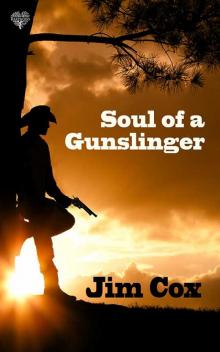 Soul of a Gunslinger
Soul of a Gunslinger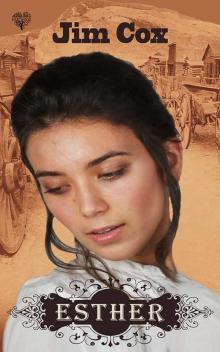 Esther
Esther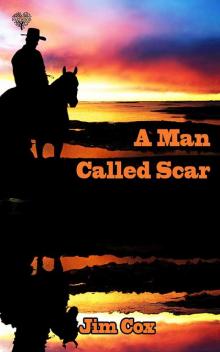 A Man Called Scar
A Man Called Scar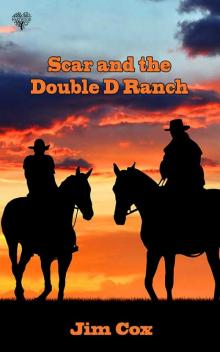 Scar and the Double D Ranch
Scar and the Double D Ranch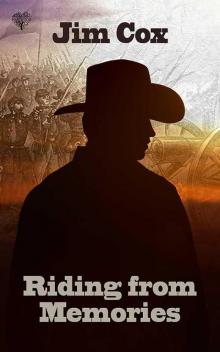 Riding from Memories
Riding from Memories